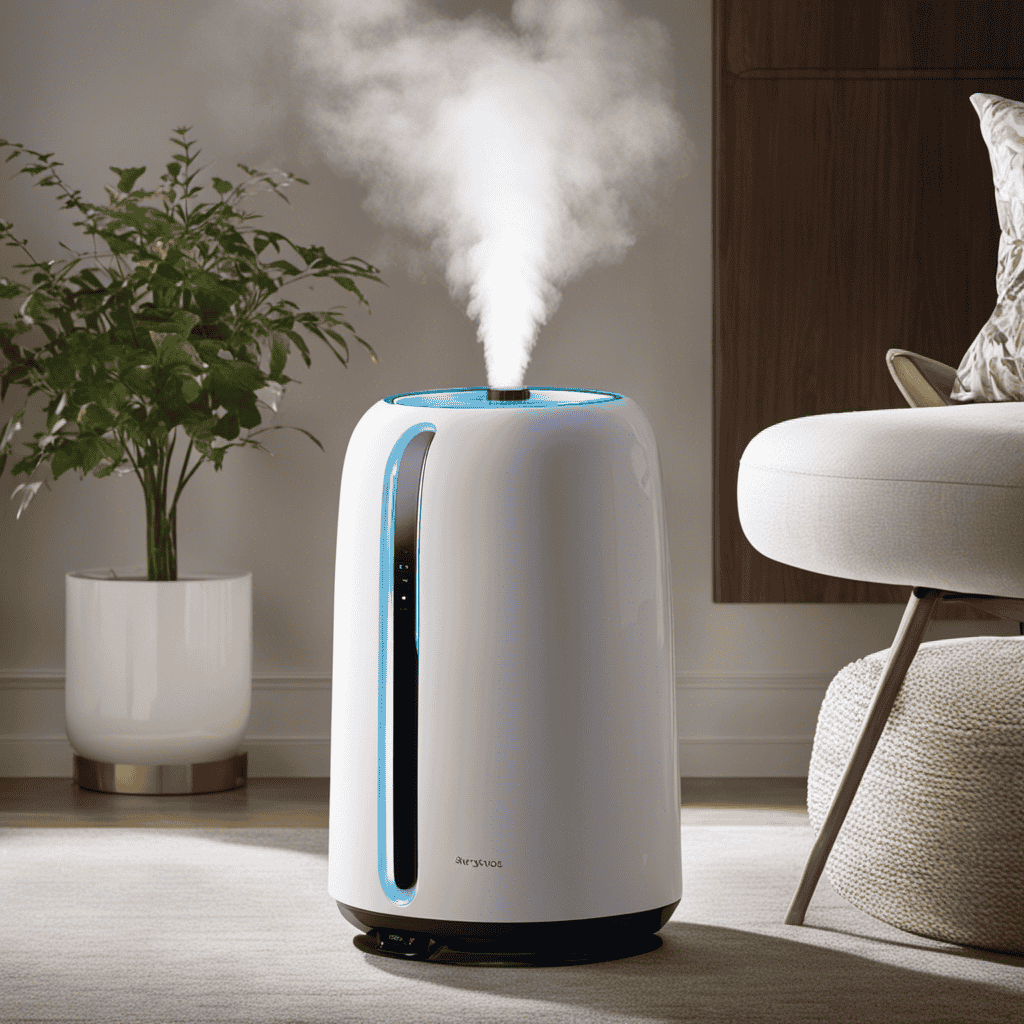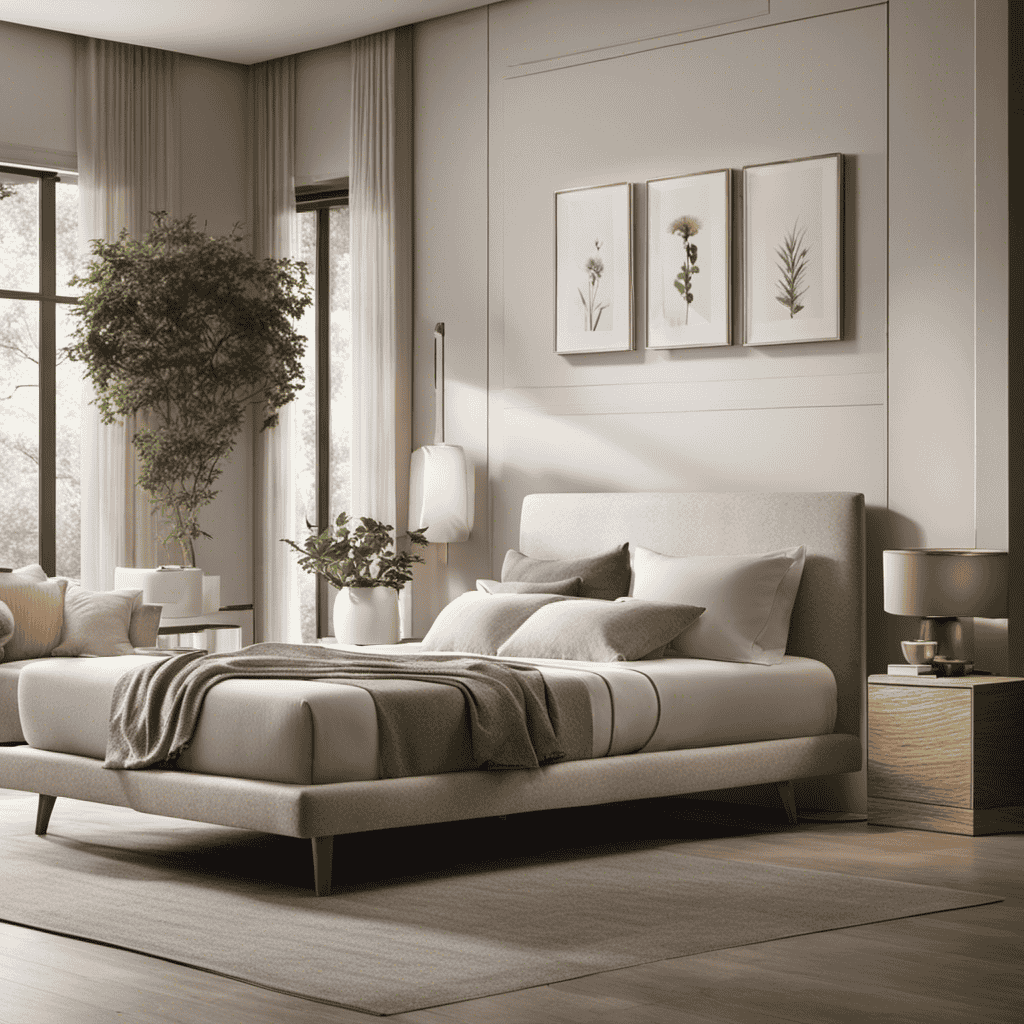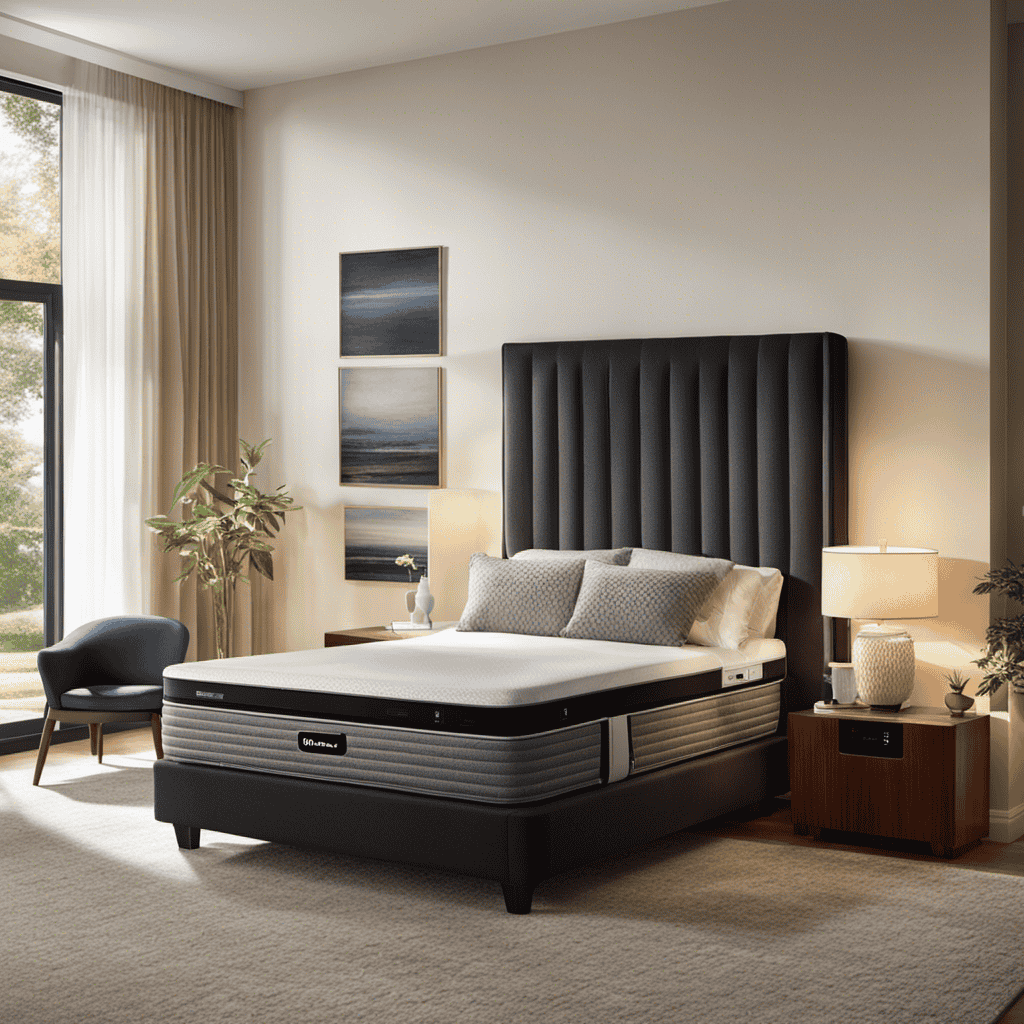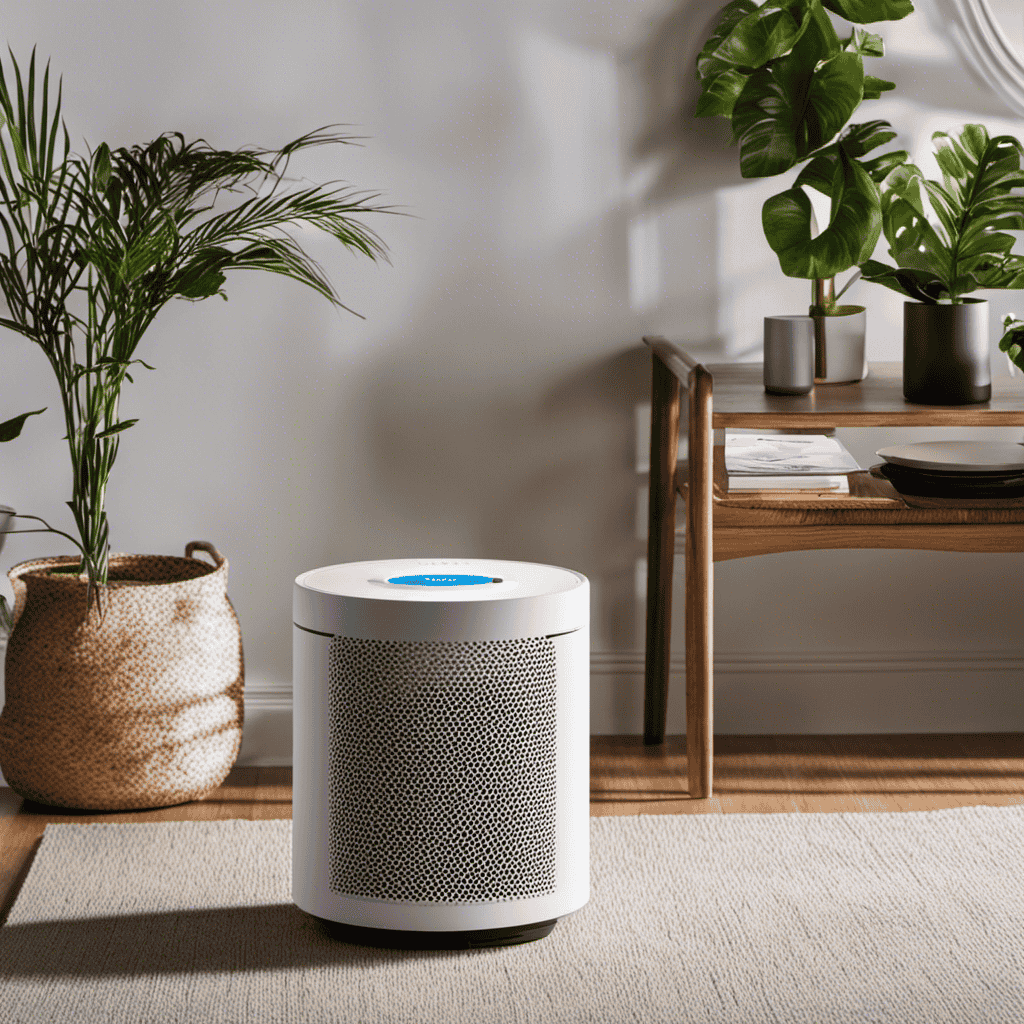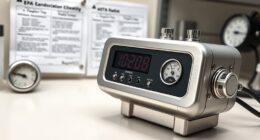While I am at home, amidst the busy routines of daily life, I find myself pondering the quality of the air I am breathing. Is it pure? Is it adequately humid?
These questions led me to explore the difference between a humidifier and an air purifier. These two devices may seem similar, but their functions and purposes are distinct.
Join me as we delve into the world of humidifiers and air purifiers, unraveling the mysteries that lie within.
Key Takeaways
- Air purifiers remove pollutants and allergens from the air, while humidifiers increase the moisture content in the air.
- Air purifiers are effective in eliminating dust, pet dander, pollen, and mold spores, while humidifiers alleviate dryness in the skin and respiratory system.
- Air purifiers focus on removing airborne particles and pollutants, capturing and neutralizing harmful substances, while humidifiers indirectly reduce allergen concentration and make breathing easier.
- The choice between a humidifier and an air purifier depends on specific needs and indoor air quality, and both devices have their own unique benefits in improving air quality and respiratory health.
Functionality
If you’re looking for a device that can help improve air quality by removing pollutants and allergens, an air purifier is what you need.
Air purifiers are highly effective in eliminating airborne particles such as dust, pet dander, pollen, and mold spores. They work by drawing in air and passing it through a series of filters that capture these contaminants. This functionality makes air purifiers a great choice for individuals with allergies, as they can significantly reduce the presence of allergens in the air.
On the other hand, humidifiers are designed to increase the moisture content in the air, which can help alleviate dryness and congestion. However, they do not have the same effectiveness as air purifiers when it comes to removing pollutants and allergens.
Purpose
When it comes to the benefits of humidifiers versus purifiers, there are some key differences to consider.
Humidifiers are designed to add moisture to the air, which can help alleviate dryness in the skin and respiratory system.
On the other hand, purifiers are specifically designed to remove pollutants and allergens from the air, improving overall air quality.
While both devices have their own unique benefits, understanding their functionality is crucial in determining which one is best suited for your needs.
Humidifier Vs. Purifier: Benefits
To understand the benefits of a humidifier vs. an air purifier, you should consider how each device can improve your indoor air quality.
Humidity levels play a crucial role in maintaining a healthy environment. A humidifier adds moisture to the air, preventing dryness in your skin, throat, and nasal passages. It can also alleviate symptoms of allergies and asthma by keeping the airways moist.
On the other hand, an air purifier focuses on removing airborne particles and pollutants from the air. It uses various air purification methods such as HEPA filters or ionizers to capture and neutralize harmful substances like dust, pet dander, and pollen.
Both devices have their unique benefits, but understanding your specific needs and the quality of your indoor air will help determine which one is most suitable for you.
Humidifier Vs. Purifier: Functionality
Understanding how each device works is crucial in determining which one will best meet your needs. A humidifier and an air purifier have different functionalities when it comes to humidity control and moisture addition.
| Functionality | Humidifier | Air Purifier |
|---|---|---|
| Humidity Control | ✔️ | ❌ |
| Moisture Addition | ✔️ | ❌ |
| Air Purification | ❌ | ✔️ |
A humidifier is designed to increase the moisture levels in the air, making it ideal for those who live in dry climates or suffer from dry skin or respiratory issues. It adds moisture to the air, improving overall air quality and comfort. On the other hand, an air purifier is specifically designed to remove pollutants, allergens, and contaminants from the air, improving indoor air quality. It eliminates dust, pollen, pet dander, and other harmful particles, making it beneficial for those suffering from allergies or asthma. So, depending on your specific needs, you can choose between a humidifier or an air purifier to enhance the quality of your indoor air.
Benefits
You’ll enjoy the benefits of a humidifier by adding moisture to the air, which can help alleviate dry skin and respiratory issues. Maintaining proper humidity levels is crucial for our overall well-being.
Dry air can cause dryness and irritation in the skin, as well as dry out our nasal passages and throat, leading to respiratory discomfort. By increasing the humidity in our indoor environment, a humidifier can help alleviate these problems.
Additionally, some humidifiers are equipped with air purification features, which further enhance the air quality by eliminating impurities such as dust, allergens, and bacteria. This dual functionality makes humidifiers a valuable addition to any home, as they not only improve the humidity levels but also contribute to air purification.
Air Quality Improvement
When it comes to improving air quality, there are several factors to consider.
Firstly, understanding the health benefits of clean air is crucial. Clean air can reduce the risk of respiratory illnesses, allergies, and even cardiovascular diseases.
Secondly, it is important to identify the types of air pollutants that can be present in our environment, such as particulate matter, volatile organic compounds, and carbon monoxide.
Lastly, choosing the right device, like an air purifier, can effectively remove these pollutants and improve the air quality in our homes or workplaces.
Health Benefits of Air Quality
Improving air quality can have numerous health benefits, such as reducing the risk of respiratory issues. One way to ensure that the air we breathe is clean and safe is through air quality monitoring. This process involves measuring the levels of pollutants in the air, such as particulate matter and volatile organic compounds.
By monitoring air quality regularly, we can identify areas of concern and take necessary actions to improve the situation. Additionally, following air quality standards is crucial in maintaining a healthy environment. These standards are set by regulatory agencies to ensure that the air we breathe meets certain criteria for safety.
Adhering to these standards can help prevent health problems associated with poor air quality, such as asthma and lung diseases. Therefore, it is essential to prioritize air quality monitoring and compliance with air quality standards for our overall well-being.
Types of Air Pollutants
To understand the impact of air pollutants on your health, it’s important to be aware of the different types of pollutants that can be found in the air you breathe. These pollutants can have a significant effect on your indoor air quality and overall well-being.
Here are five common types of air pollutants that you should be aware of:
-
Particulate Matter (PM): Tiny particles suspended in the air, such as dust, pollen, and smoke, can irritate your respiratory system and cause allergies or asthma.
-
Volatile Organic Compounds (VOCs): Chemicals released from everyday products like paints, cleaning supplies, and furniture can contribute to poor indoor air quality and even long-term health issues.
-
Carbon Monoxide (CO): This colorless, odorless gas is produced by combustion appliances and can be deadly if inhaled in high concentrations.
-
Nitrogen Dioxide (NO2): Released from burning fuels, this gas can aggravate respiratory conditions and contribute to the formation of smog.
-
Ozone (O3): While beneficial in the upper atmosphere, ground-level ozone can cause respiratory problems and worsen existing lung conditions.
Understanding these pollutants is crucial for maintaining healthy indoor air quality and ensuring proper humidity regulation in your home.
Choosing the Right Device
When it comes to choosing the right device for your needs, it’s important to consider factors such as humidity control and noise reduction. Both humidifiers and air purifiers offer different benefits in these areas. Let’s take a look at a comparison table to help you understand the differences:
| Device | Humidity Control | Noise Reduction |
|---|---|---|
| Humidifier | Increases humidity levels in the air, providing relief from dryness and promoting better respiratory health. | Some humidifiers can produce a slight humming sound, but overall, they tend to be quiet. |
| Air Purifier | Does not have a direct impact on humidity levels. However, by removing airborne pollutants, it can indirectly improve air quality and reduce dryness. | Air purifiers are designed to operate quietly, with noise levels often comparable to a whisper. |
Humidity Control
Maintaining proper humidity levels in your home can help improve indoor air quality. Controlling the humidity in your home is essential for preventing the growth of mold and ensuring a healthy living environment.
Here are five reasons why maintaining the right humidity levels is crucial:
-
Reduced mold growth: High humidity levels create a favorable environment for mold to thrive. By controlling the humidity, you can prevent mold growth and protect your home from potential health risks.
-
Improved respiratory health: Excessive humidity can lead to respiratory issues, such as allergies and asthma. Maintaining optimal humidity levels can reduce these risks and promote better respiratory health.
-
Enhanced comfort: Balanced humidity levels make your home more comfortable to live in, preventing discomfort caused by dry or overly humid air.
-
Preservation of furniture and belongings: Proper humidity control helps prevent damage to your furniture, wooden floors, and other belongings caused by excessive moisture or dryness.
-
Energy efficiency: By maintaining the right humidity levels, you can optimize your HVAC system’s efficiency and reduce energy consumption, leading to cost savings in the long run.
Allergen Removal
In addition to controlling humidity, another important function of air purifiers and humidifiers is allergen control. Allergens, such as dust mites, pollen, and pet dander, can trigger respiratory health issues, especially for individuals with allergies or asthma. Both air purifiers and humidifiers can help alleviate these symptoms by removing airborne allergens from the air. However, they do so in different ways.
Air purifiers use filters to trap and remove particles, including allergens, from the air. These filters can capture even the tiniest particles, providing cleaner air for better respiratory health. On the other hand, humidifiers do not directly remove allergens. Instead, they add moisture to the air, which can help reduce the concentration of airborne allergens. By maintaining a proper level of humidity, humidifiers can alleviate respiratory discomfort caused by dry air and make it easier to breathe.
In the table below, I have summarized the main differences between air purifiers and humidifiers in terms of allergen control and their impact on respiratory health.
| Aspect | Air Purifiers | Humidifiers |
|---|---|---|
| Allergen Control | Use filters to trap allergens | Add moisture to reduce allergen concentration |
| Respiratory Health | Remove allergens from the air | Alleviate discomfort caused by dry air |
Both air purifiers and humidifiers play a crucial role in improving indoor air quality and maintaining respiratory health. It is important to consider your specific needs and consult with a healthcare professional to determine the best option for you.
Moisture Addition
Humidity control methods play a crucial role in maintaining a healthy indoor environment. In this discussion, we will explore various techniques to add moisture to the air and their impact on our well-being.
Understanding the health benefits of moisture is vital as it can alleviate respiratory issues, prevent dry skin, and even improve sleep quality.
Humidity Control Methods
To control the humidity in your home, you can use various methods such as using a humidifier or an air purifier. Humidity levels can greatly impact our comfort and overall well-being. Here are five benefits of using these air purification methods:
-
Improved respiratory health: By reducing excess moisture in the air, both humidifiers and air purifiers help alleviate symptoms of respiratory conditions such as asthma or allergies.
-
Preventing mold and mildew growth: High humidity levels can promote the growth of mold and mildew, which can be harmful to both our health and home. These devices help maintain optimal humidity levels, reducing the risk of mold growth.
-
Enhanced sleep quality: Humidifiers can add moisture to the air, preventing dryness that can cause discomfort during sleep, leading to a more restful night’s sleep.
-
Reduced static electricity: Dry air can lead to an increase in static electricity, causing annoying shocks and damage to electronics. Both humidifiers and air purifiers can help maintain proper humidity levels, reducing static electricity.
-
Fresher indoor air: Air purifiers can remove pollutants, allergens, and odors from the air, resulting in cleaner and fresher indoor air quality.
Health Benefits of Moisture
Maintaining optimal moisture levels in the air can have numerous health benefits for individuals. When the air is too dry, it can cause irritation and dryness in the respiratory system, leading to discomfort and even respiratory infections. On the other hand, high humidity levels can promote the growth of mold, dust mites, and other allergens, which can worsen respiratory conditions such as asthma and allergies.
By keeping moisture levels in check, we can help alleviate these issues and improve respiratory health. Proper humidity levels can also help to soothe dry skin, reduce the risk of nosebleeds, and alleviate symptoms of sinus congestion.
Overall, maintaining balanced moisture levels in the air is crucial for optimal respiratory health.
In the next section, we will explore the specific health effects of humidity control methods.
Health Effects
Using an air purifier can help reduce allergens and improve indoor air quality. Airborne contaminants can pose a significant threat to our respiratory health, and it is crucial to take appropriate measures to minimize their impact.
Here are five reasons why using an air purifier can have a positive effect on our well-being:
- Eliminates allergens such as pollen, dust mites, and pet dander, providing relief for allergy sufferers.
- Removes harmful pollutants like smoke, VOCs, and mold spores, preventing respiratory irritation and long-term health issues.
- Reduces the spread of airborne viruses and bacteria, helping to maintain a healthier environment.
- Enhances sleep quality by removing airborne particles that can trigger breathing difficulties during the night.
- Minimizes the risk of asthma attacks and other respiratory problems, improving overall lung function and well-being.
Maintenance Requirements
Regularly cleaning and replacing the filters in your air purifier is essential to ensure its optimal performance and effectiveness in removing airborne contaminants. Maintaining the filters not only helps to keep the air purifier running efficiently, but it also prolongs its lifespan.
When it comes to humidity levels, some air purifiers are equipped with built-in humidifiers that can help to maintain a balanced moisture level in the air. However, it is important to note that not all air purifiers have this feature, so if controlling humidity is a priority for you, make sure to choose a model that offers this functionality.
Additionally, filter replacement is a crucial aspect of air purifier maintenance. It is recommended to replace the filters on a regular basis to ensure that the air purifier continues to effectively remove pollutants from the air.
Transition: Now that we have discussed the maintenance requirements of air purifiers, let’s move on to the cost considerations involved in owning and operating these devices.
Cost Considerations
Transitioning to cost considerations, it’s important to factor in the price of replacement filters when budgeting for an air purifier. Replacement filters are an ongoing expense that should be taken into account when calculating the overall cost of owning an air purifier. Here are some key points to consider:
-
Replacement Filters: The cost of replacement filters can vary widely depending on the brand and model of the air purifier. It’s important to research and compare prices to ensure you’re getting the best value.
-
Lifespan of Filters: The lifespan of filters can vary from a few months to a year or more. Consider the frequency of filter changes and factor that into your budget.
-
Energy Consumption: Look for air purifiers that are energy-efficient to help reduce long-term energy costs. Energy-saving features can contribute to significant long-term savings.
-
Long-Term Savings: While air purifiers may have upfront costs and ongoing filter expenses, they can provide long-term savings by improving indoor air quality and potentially reducing the need for medical treatments or medications related to respiratory issues.
-
Warranty and Support: Consider the warranty and support options offered by the manufacturer. This can provide peace of mind and potentially save you money on repairs or replacements in the future.
Energy Efficiency
When considering the energy efficiency of humidifiers and air purifiers, three key points come to mind: the cost of operation, power consumption comparison, and the environmental impact assessment.
The cost of operation is an important factor to consider as it directly affects our monthly expenses.
Power consumption comparison helps us understand the energy usage of each device and its impact on the environment.
Lastly, evaluating the environmental impact assessment allows us to make an informed decision about which option is more sustainable in the long run.
Cost of Operation
The cost of operating a humidifier can be higher due to the need for regular water refills. While humidifiers provide numerous benefits, it’s important to consider the financial implications.
Here are some key points to consider:
-
Frequent water refills: Humidifiers require regular refilling of water, which can be time-consuming and inconvenient.
-
Increased energy consumption: Running a humidifier continuously can lead to higher energy consumption, resulting in increased utility bills.
-
Maintenance and filter replacements: Humidifiers require regular maintenance and filter replacements, adding to the overall cost of operation.
-
Potential for mold and bacteria growth: If not properly maintained, humidifiers can become breeding grounds for mold and bacteria, which may require professional cleaning or replacement.
-
Long-term savings: Despite the higher initial cost, investing in an energy-efficient humidifier can result in long-term savings by reducing energy consumption and minimizing maintenance needs.
Considering these factors can help you make an informed decision about whether the cost of operating a humidifier aligns with your needs and budget.
Power Consumption Comparison
To determine which option is more cost-effective, you can compare the power consumption of a humidifier and an air purifier.
When it comes to energy-saving features, air purifiers tend to be more efficient. Many air purifiers have built-in sensors that automatically adjust the fan speed based on the air quality, reducing power consumption when the air is clean. Additionally, some models have sleep modes or timers that allow you to schedule when the device is active, further saving energy.
On the other hand, humidifiers generally consume more power because they need to heat water or disperse mist. However, it’s important to consider the long-term cost analysis.
While air purifiers may have lower power consumption, humidifiers can help maintain a comfortable and healthy indoor environment, which can potentially reduce medical expenses in the long run.
Environmental Impact Assessment
Now that we have compared the power consumption of humidifiers and air purifiers, let’s move on to assessing their environmental impact.
When it comes to health impact, both humidifiers and air purifiers have their benefits. Humidifiers help alleviate dry skin, respiratory issues, and allergies by adding moisture to the air. On the other hand, air purifiers remove harmful pollutants, allergens, and odors from the air, promoting cleaner and healthier indoor air quality.
In terms of environmental benefits, here are five key points to consider:
- Energy Efficiency: Look for energy-efficient models that consume less electricity, reducing your carbon footprint.
- Filter Replacement: Opt for air purifiers with washable or long-lasting filters to minimize waste.
- Material Composition: Choose units made from eco-friendly materials to reduce environmental impact.
- Noise Pollution: Select devices with low noise levels to ensure a quieter and more peaceful environment.
- Packaging and Disposal: Consider products with minimal packaging and proper disposal methods to reduce waste.
Types Available
When choosing between a humidifier and an air purifier, you’ll find different types available to suit your specific needs.
Let’s start with humidifiers. There are two main types: cool mist and warm mist. Cool mist humidifiers use a fan to blow air through a moistened filter, while warm mist humidifiers heat the water before releasing it as steam.
As for air purifiers, there are several options, including HEPA filters, activated carbon filters, and UV germicidal irradiation. HEPA filters are effective in removing particles like dust, pollen, and pet dander, while activated carbon filters absorb odors and chemicals. UV germicidal irradiation uses ultraviolet light to kill bacteria and viruses.
When considering coverage options, check the square footage that the device can handle to ensure it covers your desired area.
In terms of maintenance requirements, humidifiers typically require regular cleaning and filter replacement, while air purifiers may only need filter replacement depending on the type.
Coverage Area
The coverage area of each type varies, so it’s important to consider the square footage that the device can handle. A humidifier is designed to add moisture to the air, making it ideal for small rooms or personal use. On the other hand, an air purifier is meant to remove pollutants and improve air quality, making it suitable for larger spaces.
When choosing between the two, it’s crucial to understand your needs and the size of the area you want to treat. Here are some key factors to consider:
-
Room Size: Ensure the device can effectively cover the square footage of your space.
-
Humidity Range: Look for a humidifier that offers a wide range of humidity levels to meet your specific needs.
-
Air Purification Techniques: Research the different technologies used in air purifiers, such as HEPA filters or activated carbon filters, to determine which one suits your requirements.
-
Noise Level: Consider the noise output of the device, especially if you plan to use it in a bedroom or other quiet areas.
-
Maintenance: Check the maintenance requirements of each device, including filter changes or water tank refills, to ensure ease of use and longevity.
Noise Level
Consider the noise output of each device, especially if you plan to use it in a bedroom or other quiet areas. When comparing humidifiers and air purifiers, it’s important to consider the noise level they produce.
Humidifiers generally produce a low hum or white noise, similar to a fan, which can be soothing for some people. On the other hand, air purifiers can vary in noise level depending on the model and settings.
Some air purifiers operate silently, while others may produce a noticeable sound, similar to a low-speed fan or a gentle breeze. It’s crucial to check the noise level specifications of both devices before making a decision.
Additionally, it’s worth considering the power consumption of each device to ensure energy efficiency.
Transitioning into the next section, choosing the right option requires evaluating other factors such as functionality and maintenance.
Choosing the Right Option
To choose the right option, you should evaluate factors such as functionality and maintenance. When it comes to addressing allergies, an air purifier is generally considered more effective than a humidifier. Air purifiers are designed to filter out airborne pollutants, such as pollen, dust, and pet dander, which can trigger allergies. On the other hand, humidifiers add moisture to the air, which can help relieve dryness and congestion but may not directly address the allergens causing the symptoms.
When it comes to reducing odors, both air purifiers and humidifiers can be effective, but the specific effectiveness may depend on the type of odor and the technology used in each device. It’s important to consider your specific needs and consult with a healthcare professional if you have severe allergies or respiratory conditions.
-
Air purifiers are equipped with HEPA filters that capture tiny particles, providing cleaner air.
-
Humidifiers can help alleviate dry skin and respiratory issues caused by dry air, providing comfort.
-
Air purifiers eliminate pet dander and pet odors, creating a fresh and clean environment.
-
Humidifiers can help reduce static electricity in the air, making it easier to breathe and reducing discomfort.
-
Air purifiers can remove smoke particles and odors, improving indoor air quality and creating a healthier living environment.
Are Humidifiers and Air Purifiers Interchangeable?
The difference between humidifier and air purifier lies in their functions. While a humidifier adds moisture to the air, an air purifier removes impurities such as dust, pollen, and pet dander. While they can both improve indoor air quality, they serve different purposes and are not interchangeable.
Frequently Asked Questions
Can a Humidifier and Air Purifier Be Used Together for Maximum Air Quality Improvement?
Using a humidifier and air purifier together can greatly improve air quality. The humidifier adds moisture to the air, reducing dryness, while the air purifier filters out pollutants. To maximize effectiveness, choose models that complement each other and maintain proper maintenance.
What Are the Potential Health Risks of Using a Humidifier or Air Purifier Incorrectly or Excessively?
Using a humidifier or air purifier incorrectly or excessively can have potential side effects on your health. It’s crucial to understand proper usage to avoid any risks and ensure the best air quality.
How Often Should I Clean and Maintain My Humidifier or Air Purifier to Ensure Optimal Performance?
I clean and maintain my humidifier or air purifier regularly to ensure optimal performance. Cleaning frequency depends on usage, but common maintenance tasks include replacing filters, cleaning the water tank, and checking for any clogs or blockages.
Are There Any Specific Types of Humidifiers or Air Purifiers That Are More Suitable for People With Allergies or Respiratory Conditions?
The best humidifiers for people with allergies and air purifiers for respiratory conditions are those that have HEPA filters, as they can effectively remove allergens and pollutants from the air.
What Factors Should I Consider When Choosing Between a Humidifier and an Air Purifier for My Specific Needs and Preferences?
When choosing between a humidifier and an air purifier for my specific needs and preferences, I consider factors like the level of humidity I want and the types of contaminants I want to remove. Using them together maximizes air quality improvement.
Conclusion
In conclusion, the difference between a humidifier and an air purifier is like the contrast between a gentle breeze and a soothing rain shower.
While both serve to improve the air quality, a humidifier adds moisture to combat dryness, symbolizing comfort and relaxation.
On the other hand, an air purifier filters out pollutants, symbolizing purity and cleanliness.
Understanding their unique functionalities and benefits is crucial in choosing the right option that suits your needs and creates a harmonious atmosphere in your living space.
